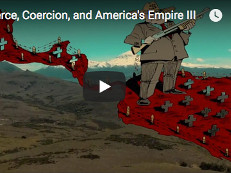I learned a lot about the United States presence in Guatemala growing up. I think there is something especially consumable about a war waged based on fruit. While I appreciate Dawson’s use of this example, I think that it obscures and takes place of other extremely violent forms of United States interventionism. The Cold War resulted in some of the most despicable maneuvers that are often left untouched in Latin American history courses such as the heavy involvement in the Sandanista movement. I wish that textbooks and more accessible literature widened their scope of example. Nicaragua is one of the most compelling revolutions in my opinion just from the massive female involvement in creating a new government. In reading about the United Fruit Company, I remembered a Pablo Neruda poem titled “United Fruit Co.”
When the trumpet sounded
everything was prepared on earth,
and Jehovah gave the world
to Coca-Cola Inc., Anaconda,
Ford Motors, and other corporations.
The United Fruit Company
reserved for itself the most juicy
piece, the central coast of my world,
the delicate waist of America.
It rebaptized these countries
Banana Republics,
and over the sleeping dead,
over the unquiet heroes
who won greatness,
liberty, and banners,
it established an opera buffa:
it abolished free will,
gave out imperial crowns, encouraged envy, attracted
the dictatorship of flies:
Trujillo flies, Tachos flies
Carias flies, Martinez flies,
Ubico flies, flies sticky with
submissive blood and marmalade,
drunken flies that buzz over
the tombs of the people,
circus flies, wise flies
expert at tyranny.
With the bloodthirsty flies
came the Fruit Company,
amassed coffee and fruit
in ships which put to sea like
overloaded trays with the treasures
from our sunken lands.
Meanwhile, the Indians fall
into the sugared depths of the
harbors and are buried in the
morning mists;
a corpse rolls, a thing without
name, a discarded number,
a bunch of rotten fruit
thrown on the garbage heap.
I think Neruda’s poem is extremely powerful and effective at communicating the issues with United States interventionism. He manages to address multiple layered issues, specifically how entire countries were rebranded as Banana Republics. At the same time, the indigenous were on the receiving end of violence that exploited their labor for fruit. Bodies become synonymous with rotten fruit being discarded without much thought. The poem reminds me a bit about the struggle surrounding the Panama Canal where so many lives were lost for material gain. Neruda captivates by eloquently capturing the greed of these companies in imagery of the rich fruit and “sunken lands.”
It is really interesting to see how Latin American artists use surrounding political issues to form their art. I hope that we get to look into magical realism and poetry as an aspect of Latin American culture.

